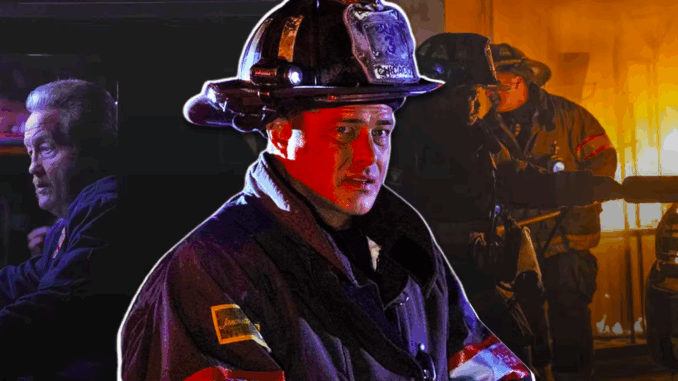
A Tense Beginning to the End
Season 13 of Chicago Fire brought audiences back into the smoky chaos of Firehouse 51 with everything fans have come to expect: danger, adrenaline, and camaraderie. But as the season marched toward its finale, the strongest flames weren’t coming from burning buildings—they were coming from inside the department itself.
The shocking storyline involving Chief Pascal—accused of stalking and potentially harming a victim—placed the entire firehouse under a moral microscope. And at the center of the chaos was Kelly Severide, whose loyalty to Pascal put his own career on the line. This wasn’t just another case; it was a test of brotherhood, ethics, and the code firefighters live by.
The Pascal Problem: A Firestorm of Suspicion
The finale picked up moments after the penultimate episode’s gut-punch: Pascal being questioned by police, surrounded by evidence suggesting he’d been following a civilian. Although not officially charged, Pascal’s situation sent shockwaves through the ranks. The storyline quickly grew from a personal dilemma to a crisis of trust across Firehouse 51.
Lieutenant Van Meter’s confrontation with Severide made one thing clear—loyalty without accountability has consequences. Severide’s failure to inform Van Meter about his suspicions regarding Pascal put him in direct jeopardy, risking charges as an accessory. The show didn’t just lean into the drama—it pulled back the curtain on the ethical dilemmas public servants quietly wrestle with.
Severide’s Moral Crossroads
For Kelly Severide, Season 13 was about more than just fires and rescues—it was about reckoning with the cost of protecting someone you trust when that trust starts to crack. By choosing to visit Bishop in prison, Severide took a calculated risk. His offer of a deal to expose Hendricks—the real orchestrator of the setup—wasn’t just tactical. It was a last-ditch effort to save a man who, for all intents and purposes, could’ve already been beyond redemption.
Severide’s journey this season highlighted the complexity of his character. Known for his stoic bravery and reckless edge, Season 13 added deeper shades of conscience, strategy, and vulnerability. He wasn’t just playing hero—he was playing defense, offense, and negotiator all at once.
Trust on the Line: The Fallout at Firehouse 51

With the cloud of suspicion hovering over Pascal, Firehouse 51 struggled to maintain unity. Quiet glances between squad members, moments of hesitation before backing a colleague—it all added up to a firehouse under emotional duress.
Cruz, Kidd, and Ritter each reacted differently. Cruz expressed quiet concern, questioning whether they were becoming complicit. Kidd stood firmly by Severide’s choices, trusting his judgment but visibly shaken by the gray area the team was forced into. Ritter—always the heart of the team—voiced what others were too afraid to say: What happens if we’re wrong?
These smaller interactions gave the finale its weight. The drama wasn’t just about whether Pascal was guilty. It was about what it meant for the people who stood by him when they weren’t sure.
Fans React: “This Isn’t the Severide We Met in Season 1”
Fan response to the Season 13 finale was electric. Social media lit up with praise for the storyline’s moral ambiguity. Some fans expressed admiration for Severide’s evolution, while others questioned whether his decision-making had crossed a line.
“This isn’t the Severide we met in Season 1,” one fan posted on Reddit. “He used to act from instinct. Now, he’s playing chess.”
Others were quick to point out the parallels between Pascal’s ordeal and real-world controversies around institutional loyalty and internal cover-ups. “Chicago Fire is reminding us why it’s not just a procedural—it’s a mirror,” tweeted a longtime viewer.
What Season 14 Might Explore
As the dust settles from Season 13’s dramatic final moments, one thing is clear: Firehouse 51 is no longer the same. Severide’s gamble paid off—Pascal’s name appears on its way to being cleared—but at a cost. Trust was broken, alliances were strained, and new questions were raised about what it truly means to serve together.
NBC has yet to reveal many details about Chicago Fire Season 14, but insider reports suggest the next chapter will deal directly with the consequences of Severide’s actions. There’s also speculation that Van Meter may take a more hands-on role in day-to-day operations, especially in the wake of the scandal.
The showrunners are reportedly interested in bringing back older faces for guest arcs, including possible appearances by former regulars to help stabilize the firehouse’s dynamics during this uncertain period.
Conclusion: Brotherhood in the Flames
Season 13 of Chicago Fire didn’t end with explosions or a dramatic cliffhanger—it ended with a quiet reckoning. It asked hard questions and gave imperfect answers. It took characters fans thought they knew and put them through the crucible.
Severide may have cleared Pascal’s name, but he also reignited the age-old debate: What do you do when loyalty and truth don’t align? For Firehouse 51, the flames may have subsided—but the heat is far from over.